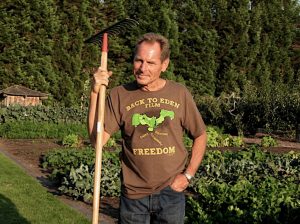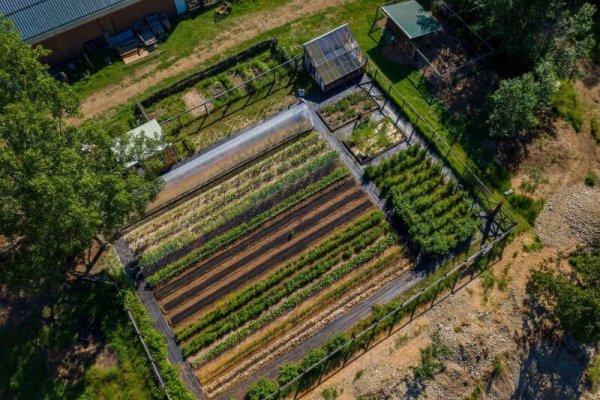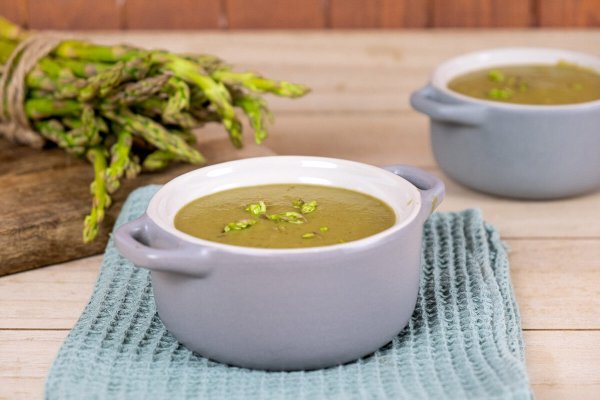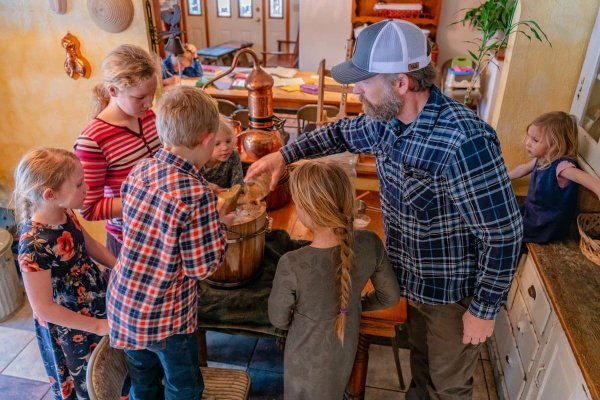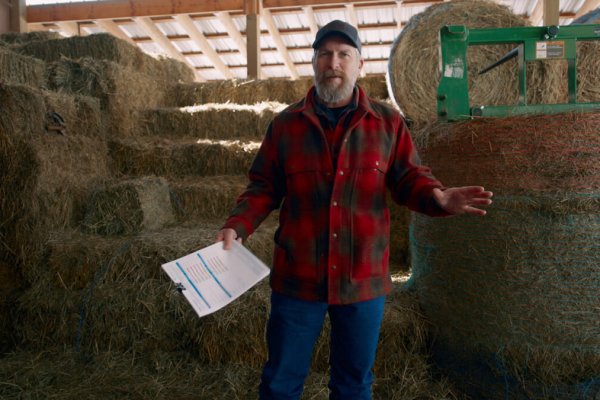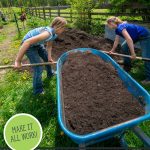

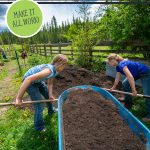
Homesteading with children sounds extremely difficult, especially for large families or those with younger children. The truth is, by teaching our children traditional skills at a young age, they’ll become contributing members of and huge assets to the family as they get older. Let’s discuss how to involve children on the homestead so that they learn to love it.
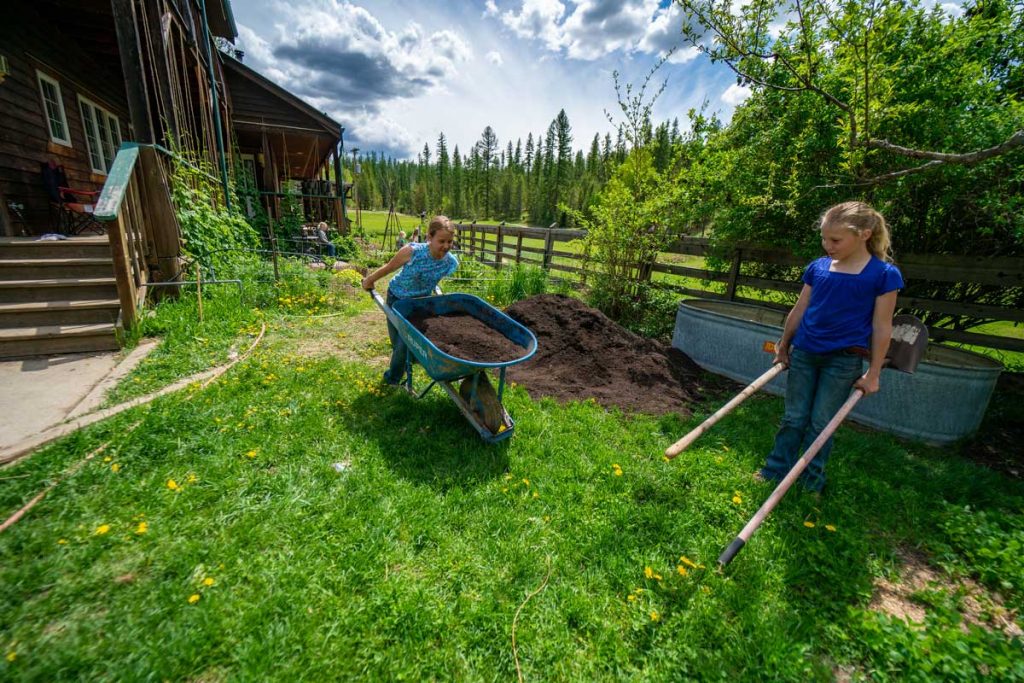
I’ve talked a lot about household management and how to keep a household running smoothly in my Household Management series. I even have an entire Household Management Course available for purchase if you’d like to know more about our household systems, schedules and routines.
In this post, you’ll find two Pantry Chat podcast episodes on the topic. One with me and Lisa Bass from Farmhouse on Boone and the other with me and Josh. This post is jam-packed with tips and ideas for including your children on the homestead and getting them to where they actually enjoy it, rather than it just being a “chore.”
The Difference Between Happy and Joy
There’s a misconception floating around today that we should do all we can to keep our kids happy at all times. But the truth is, happy doesn’t always equate joy. A true sense of joy comes from serving God, serving others and being productive.
What we’re sharing isn’t the key to making our kids have a blast every single day. We’re sharing tips to teach children hard work, skills and a deep worth and value in that work and skills they’ve learned. The satisfaction of a job well done, and helping family and community will bring about joy.

About Lisa
Lisa is a mother of eight children (two girls and six boys) that range in age from newborn up to 14 years old. She and her husband have a small homestead where they garden, bake from scratch, raise chickens and a milk cow.
In this post, Lisa and I are sharing our tips for homesteading with children based on our own experiences and what we’ve learned throughout the years.
“Stay-At-Home” Mom
Both Lisa and I have large families (compared to the average American family), we homeschool our children, and we run successful businesses, all while being stay-at-home moms.
Working from home and being together most hours of the day means everyone has to be involved; it takes teamwork to homestead.
People often tell me my children are so well-behaved. And while I kindly thank them for the compliment, the truth is, if they weren’t well-behaved, I would go crazy every day! Being with my children all day long means they have to be well-behaved, and we need order and routine.
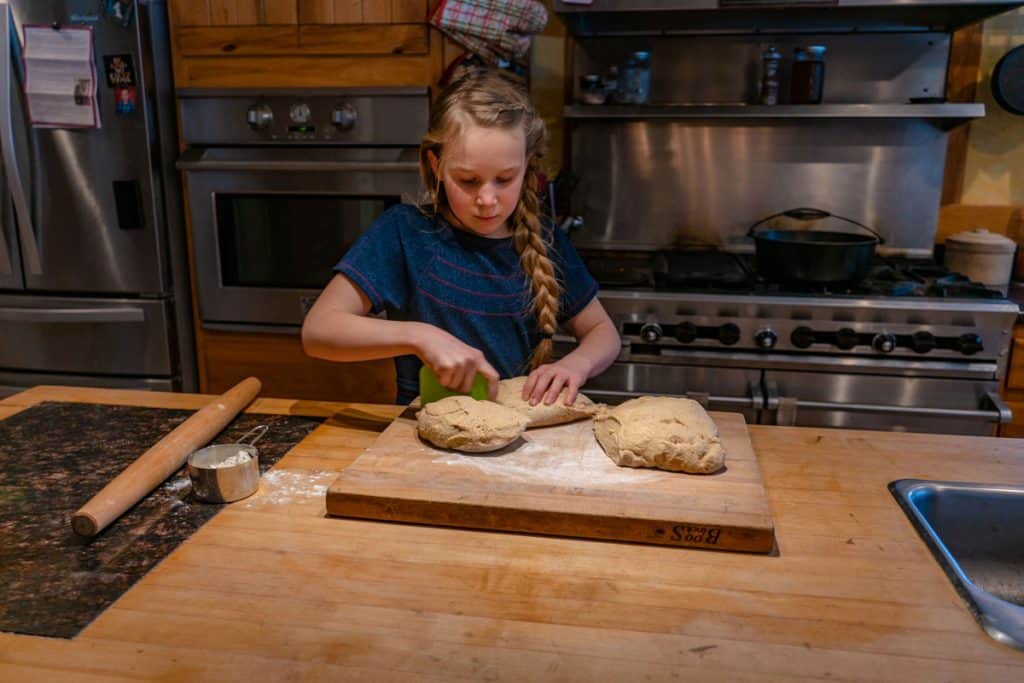
Traditional Lifestyle
Growing up, I knew very little about living a traditional lifestyle. I grew up with a mother who gardened, but never knew it was safe for farm-fresh eggs to sit out on the counter for weeks at a time. I wasn’t aware of the many benefits of raw milk and fermented foods, or even how to cure bacon or bake with sourdough.
This traditional living journey began with the birth of my first child. I have a feeling many of you are in the same boat.
You can learn more about homesteading while pregnant, our homesteading journey and educating children through homesteading.
The beauty of learning to live this lifestyle alongside your children is that our children now think these traditional methods are normal, everyday life. They won’t have to figure this out when they have their first child as we did.
So we feel like we can bless them with this knowledge that will benefit them for the rest of their lives.
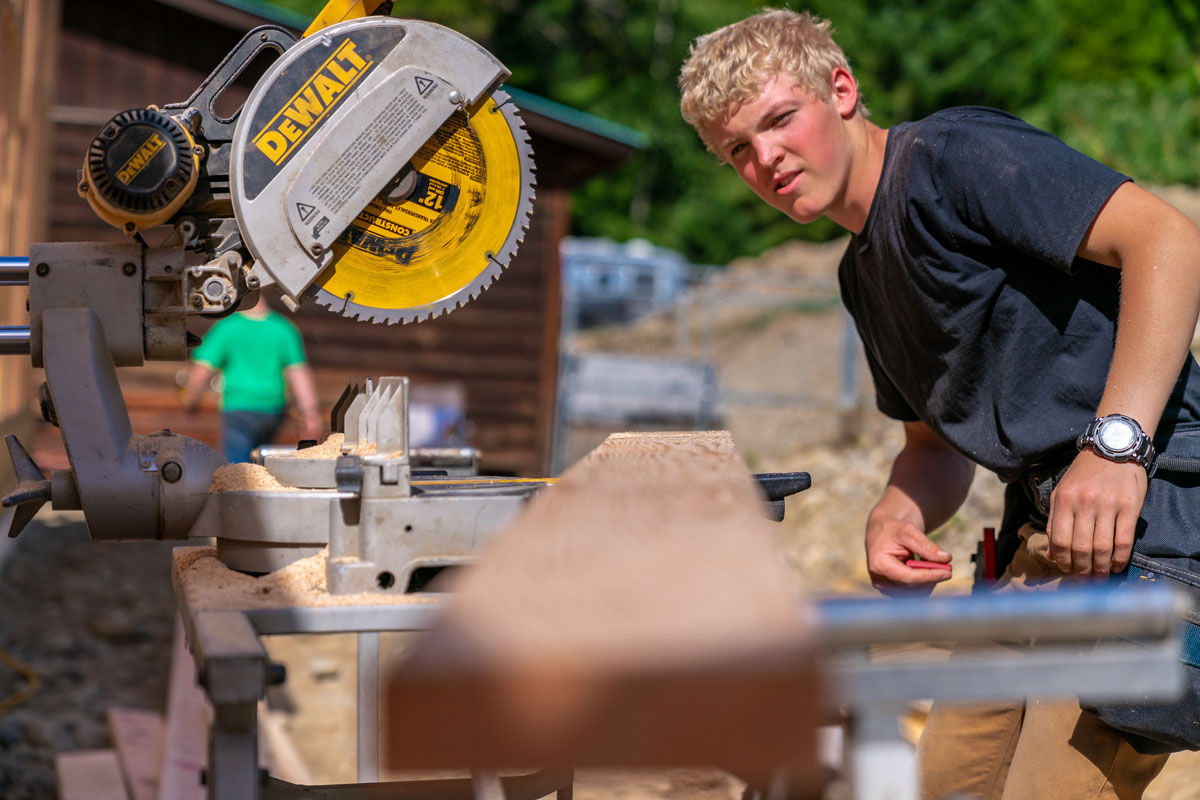
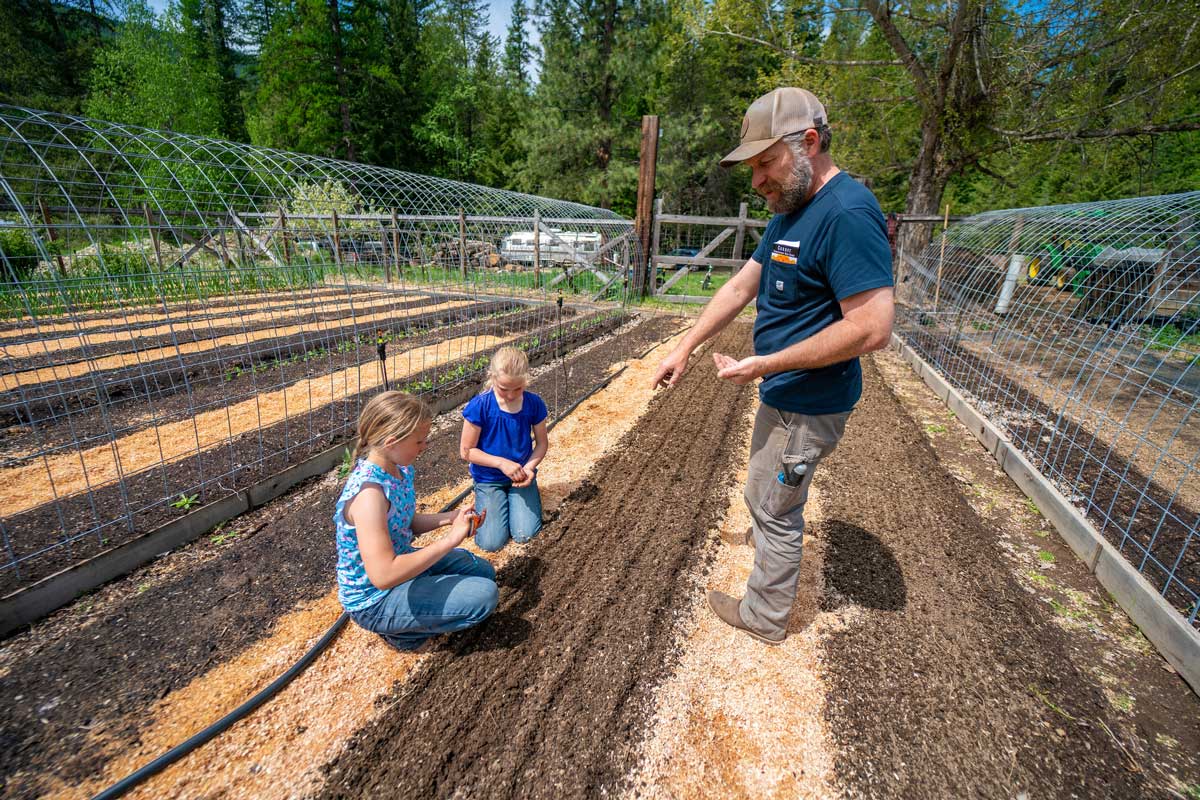
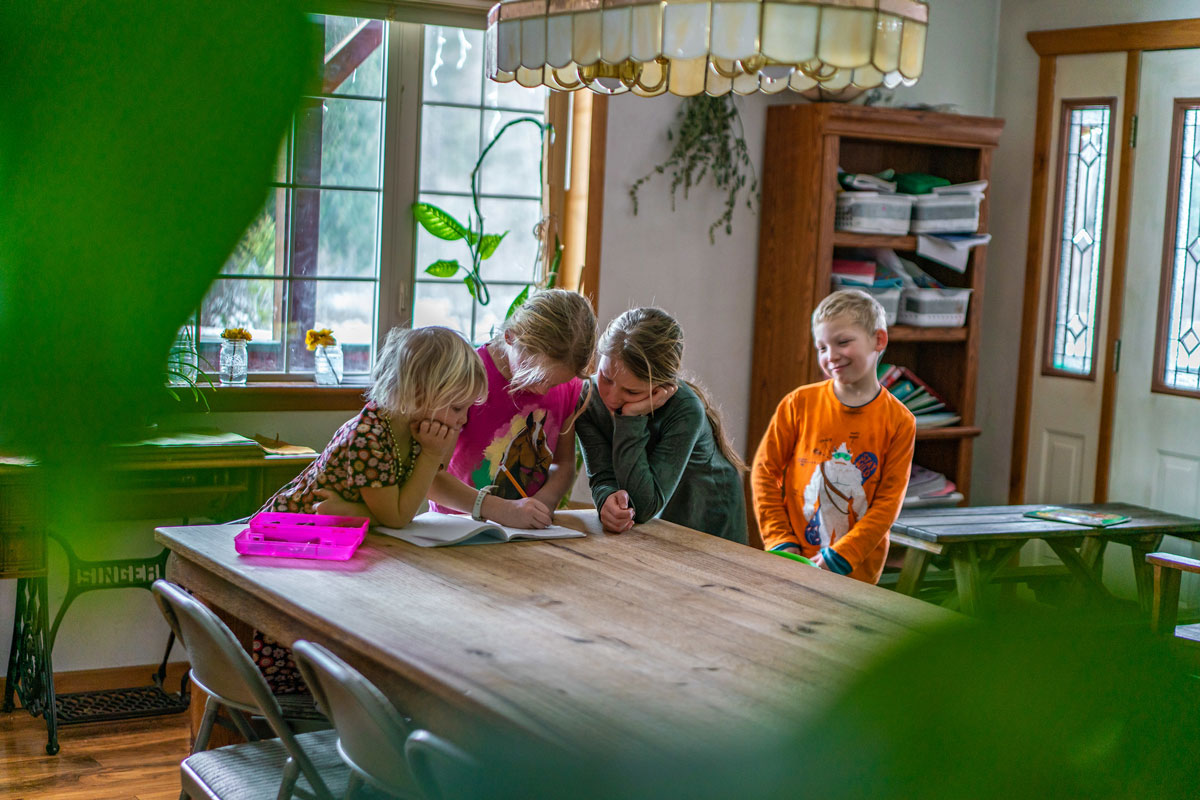
Character Benefits of Homesteading with Children
There are definite benefits for moms and dads who are homesteading with children. I jokingly say that this lifestyle is God’s maturation process for me! And looking back, there are so many ways that God has matured me from when I only had one child to now.
It’s important to remember why you started homesteading and look at the many character benefits for children that come from homesteading as well:
- Hard work ethic – When children see that hard work is part of the normal day-to-day lifestyle, they’re more accustomed to it and, therefore, will have an easier time when it comes time to enter the workforce. Furthermore, when everyone needs to pitch in on the homestead, often, younger-aged children are given responsibilities at an earlier age. Though it takes training by a parent or an older sibling, I think in today’s culture, we don’t give younger kids enough credit for their ability to help (especially because they’re usually so willing!).
- Being Productive – Homesteading and “free time” don’t go hand in hand. For our children, when there is some time that is not spent on a homestead or homeschool project, we like to encourage them to learn something, create something, or just plain old do something. This keeps them from the habit of just wanting to be entertained all the time and reduces some negative things that too much free time brings.
- Teamwork – Doing life together teaches kids that working together is necessary (and often easier). Sure, this doesn’t always look perfect, children are children, and there will be disagreements, but it gives the opportunity and the sanctifying moments to work it all out!
- Self-confidence – We certainly want our children to know their identity in Christ, but beyond that comes self-confidence in who they are in the world. Because they’re performing important functions as part of a household, they feel good about who they are and their contribution to the world, which gives them strong self-confidence to enter into adulthood.
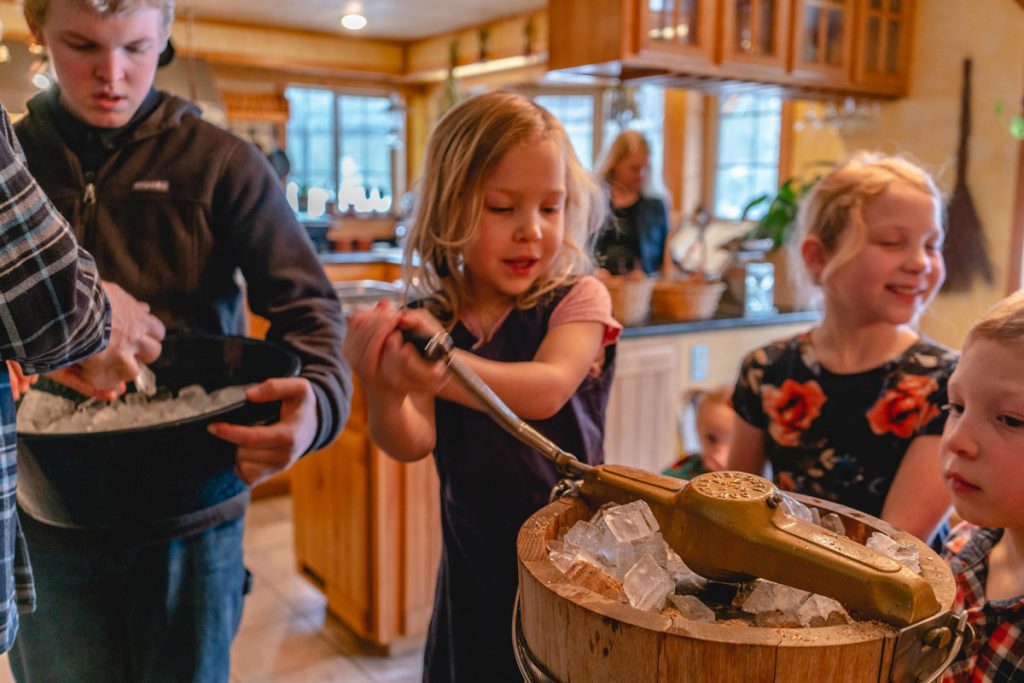
Chores on the Homestead
Our children are given easy, age-appropriate chores at a very young age (with supervision when needed). As they get older, with proper training, they’re assigned chores that they are solely responsible for.
As parents, we watch for areas of interest for each child. If one person leans more toward the kitchen and enjoys cooking, they will be assigned more kitchen tasks. If one child has more joy taking care of the animals, then they’ll get more of the animal chores.
We plan morning chores for children and early evening chores, plus help them learn how to have smooth daily transitions for a productive day.
Read these posts to learn more about chore jurisdictions and how to run a productive household.
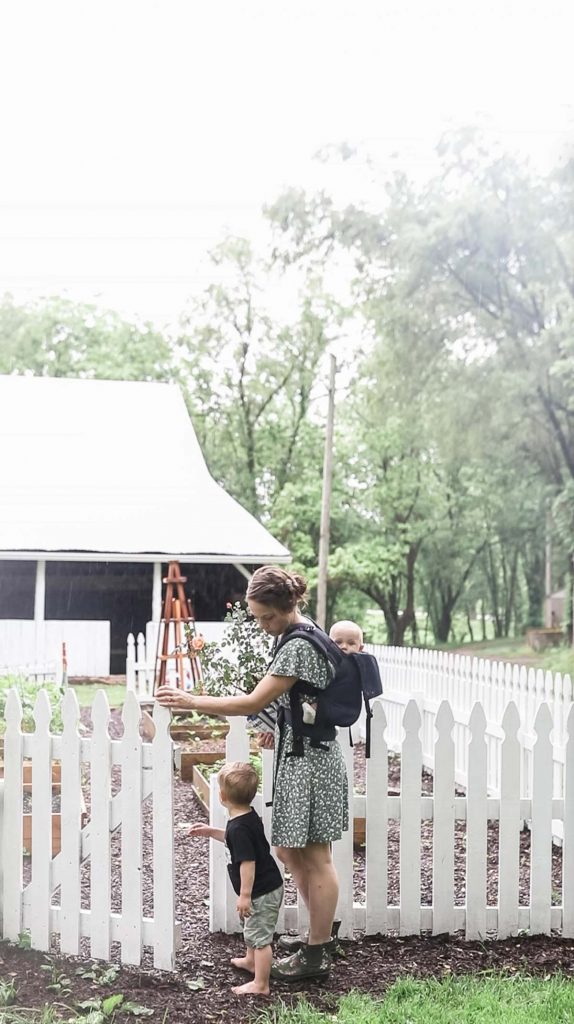
Homesteading with Babies
There’s no tougher time working on a homestead than when we have tiny babies on board. Lisa is the queen of babywearing and says that from birth to seven months, she always baby wears her kids.
More than anything else, this helps her to keep up with her day-to-day tasks without having to tend to a fussy baby. Because the babies go everywhere with her, they tend to be happy and great nappers because they simply sleep as needed.
Remember the Seasons of Life
Remember that in all things, there are seasons. Some seasons will mean you need to lean further into the children, raising them, schooling them, and teaching them. Then the roles will shift, and you’ll find more time in your day for other things. Maybe your older children begin to help teach and raise the younger ones.
I heard a saying once that children from ages 0-7 are more of a liability when it comes to their contributions to the family.
From ages 8-to 13 they’re somewhat neutral in that they contribute about equal amounts to the work they add.
And from age 14 on they are a huge asset to the family, contributing greatly to the overall tasks on the homestead.
I have found this is especially true if those children have been raised around those chores and tasks they begin helping with because they need very little instruction or teaching and become so competent in their work right away.
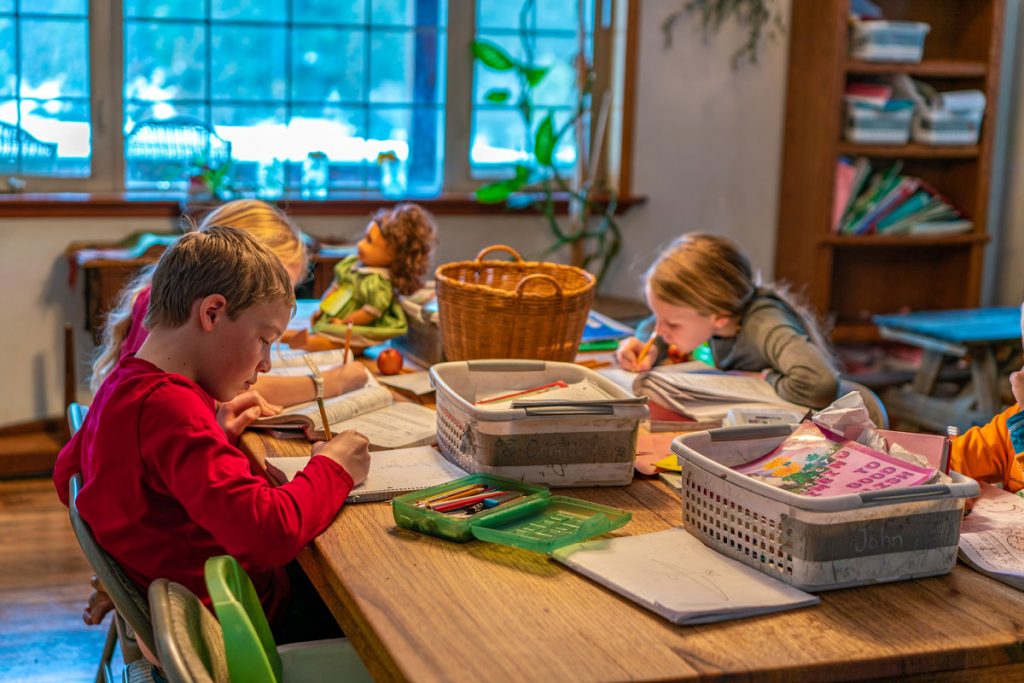
Top Tips for Homesteading with Kids
Here’s a quick list of tips for homesteading with kids:
- Find age-appropriate jobs. Getting children involved isn’t always easy, but finding age-appropriate jobs makes it more feasible.
- Give them responsibility. For us, each child gets their own garden space at a very young age. They learn so much when the responsibility is solely theirs. And sometimes, certain kids will forget to water, and the entire garden dies. But there are valuable lessons in having something that’s theirs.
- Let kids take ownership. Along with their own garden, they’ve now taken ownership of something. They get to be proud of their successes but also take ownership of failures. This is one of our top 10 parenting principles. It’s easy, as parents, to try and keep our children from failing. But being a helicopter parent doesn’t do anyone good.
- Find and recognize their interests (cooking, gardening, sewing, caring for animals, etc.) and tailor tasks to those interests.
- Give Kids Peace. Stop the nagging. Set up systems that let the schedule do the nagging for you. In our house, chores must be completed by meal times. If we’re all sitting down for breakfast and one child hasn’t completed their chores, they know they might miss out on eating unless they hustle and get it done. You can learn more about our chore routines and our chore jurisdictions here.
- Give Kids a Team. Work alongside your children, don’t just have them working under you. This isn’t possible at all times, but kids love to feel involved as part of the whole family. This helps them see how the family comes together as a team to get a project done.
- Give Kids a Sense of Accomplishment. This is huge and very important! It’s easy to move right past a completed task, but it’s important to celebrate accomplishments and point out your children individually and which part they played. This is important to do one on one and in front of the rest of the family.
- Give Kids Character. Who is teaching your children character? The schools aren’t teaching it, the television isn’t teaching it, so it really comes down to the parents to recognize character traits and guide them in the right direction. More importantly, they need to be exemplified in our own lives.
- Give Kids Support & Hold Them Accountable. We always say you can’t expect what you don’t inspect. If you give your child a job, it’s essential to follow through and make sure that job was done well to completion. If not, this is a great time for training, teaching and character-building. It’s also important to give the child what they need to do the job well. If your child isn’t getting the job done, instead of getting frustrated, consider whether you set them up well. Maybe they need a bit more instruction.
- Be Available. Make sure your children know they can always come to you to discuss when they’re unhappy with a situation. When kids know they have an outlet to come and discuss something with a parent (and if we as parents stay humble and flexible), then those lines of communication stay open and available.
- Understand that training children is also about training you! This is a season of life. Give lots of grace for the process.
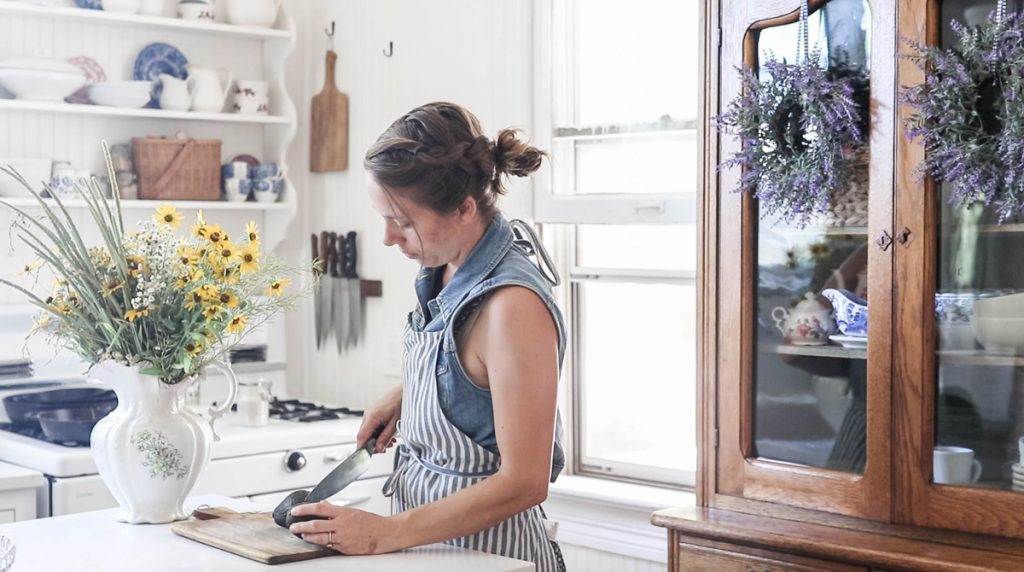
Where to Find Lisa
If you want to learn more from Lisa, you can check her out at the following places:
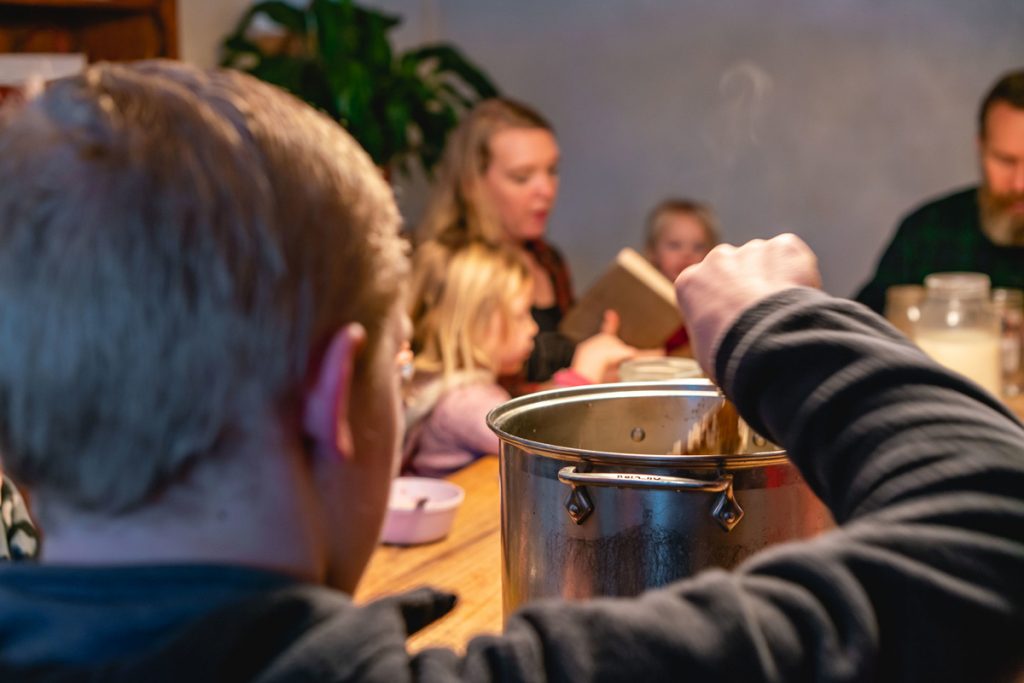
More Posts You May Enjoy
- Morning Routine for a Productive Day
- Homemade Baby Food
- Homemade Edible Playdough Recipe | Fun & Safe
- Daily Routine for Kids on the Homestead
- My Secret to Running a Productive Household
Carolyn: Hey, you guys, this is Carolyn from Homesteading Family. And welcome to this week's episode of the Pantry Chat Food For Thought. I am here this week with Lisa Bass from Farmhouse on Boone. I'm so excited that you're here, Lisa. Thank you for joining us. And we're going to be talking about homesteading with children, which is just a phenomenally fun topic. And I think one that's near and dear to both of our hearts. So thanks for joining us.
Lisa: Yeah, thanks so much for having me. I'm excited to be on.
Carolyn: So just so you know, we usually start with a little bit of chit chat. We're going to talk about what we're up to this week, and then we have a viewer question we're going to answer.
Lisa: Okay.
Carolyn: And then we'll jump right into the main topic. So if you are new to a Pantry Chat, we have that all time stamped for you below. So if you want to skip ahead to the main topic, you can do that. So, Lisa, what are you up to on your homestead right now, this week?
Lisa: Well, so we just weaned our calf, which is ridiculous because the calf is going to be one at the end of this month. But we live on a really small homestead and then we also have neighbors, so how loud it is to wean a calf has really been something that's been hard. A couple times we've tried separating the calf and then I'm like, "Okay, are the neighbors going to hear this?"
And so we were going to send the calf out to my sister's farm, keep her there for about six months and then breed her and then bring her back and milk her. But turns out she's afraid that the calf won't respect their electric fencing because she's never had it. And so we found out about those rings, which I never knew about, the weaning rings. And so now all of a sudden on a jar of milk this size we're getting half cream. And so, yeah, we should have done that ages ago. It was the easiest thing ever.
Carolyn: We've used those once or twice. And that's a good thought. We should probably use them again, because we have just ongoing problems with calves and cows when we're milking. We have not had a good dairy cow that will milk share well. And I don't know if it's just the way we're doing it or if it's our cows, but we really depend on the cream and we never get enough cream when we're sharing, doing the milk share.
So yeah, we tend to wean them and get them moved on in life pretty quickly just for cream. But right now I'm kind of going, "Gee, I wish I had a calf on." We're getting eight gallons a day. The cow is fresh and eight gallons a day. We love our milk.
Lisa: Right.
Carolyn: We love cheese and all the yogurt. But eight gallons a day, that's a lot of milk.
Lisa: That's a lot, yeah. We're getting three gallons a day because she's a year past freshening, but it's still a lot for us. I know you have a lot more kids than me and older kids, but it's still quite a bit of milk.
Carolyn: That's a lot of milk when you have to deal with it. There's no break. There's no like-
Lisa: Every day, yeah.
Carolyn: "Oh, we'll just take tomorrow off." It doesn't happen. Whether the fridge is full or not you get those three more gallons in every day.
Lisa: Yeah. Yep.
Carolyn: Well, we, over here at our homestead, we're dealing with all of the milk, all of the eggs. Every year I've kind of said, "We don't have enough chickens yet." We don't have enough eggs to be able to not only eat all the fresh eggs we want, but then put up enough and preserve enough for winter. And so we keep increasing the amount of chickens we have and increasing the amount of chickens we have. Well, we found our enough chickens.
Lisa: You're there now?
Carolyn: We're there. I think I over did it because we're literally bringing in about 75 eggs a day.
Lisa: Oh, yeah. That's enough. No, that's enough. That is.
Carolyn: Even for us, that's enough. I've got more jars of freeze dried eggs now on my pantry shelves than I even know what to do with, and I'm starting to go, "Where are we going to put all the other jars of stuff?" Because it's filling up with freeze dried eggs. So I'm liming eggs. I am doing all sorts of great things. And I think I'm about to start selling eggs because I think I've got-
Lisa: You're at that point?
Carolyn: Yeah, definitely. Somebody help. I've got too many eggs. So we're keeping up with that. We did a big garden planting day the other day. So we have the garden entirely in, which is a wonderful feeling. And then you kind of have that spring rush and then you get the garden all the way in and then it slows back down a little bit and you're kind of like, "Well what do I do now?"
So traditionally this time of year, we go back to homeschooling for a little bit longer.
Lisa: Oh, okay.
Carolyn: So we've kind of started picking up the homeschool schedule and get a little bit more done before we officially break for summer. And that happens when the harvest starts rolling in, which I know we're way behind you. We literally just planted our main crop garden. Are you already harvesting?
Lisa: We're not, but we're doing a lot of weeding right now. We're in that stage. Before everything gets big, all you're trying to do is keep up with the weeding and then you're in more smooth sailing.
Carolyn: Yep. And then it starts coming into the kitchen and it all changes all over again, huh?
Lisa: Yeah.
Carolyn: Okay. So we are going to jump into a question of the day. This one's from Laura Timpestini. It's on the crunchiest pickle video that I have, how to make the crunchiest pickles. And she asks, "Can it be made without sugar?" Now this video is a canned pickle. It's not a fermented pickle. And so do you make canned pickles or do you ferment pickles or what do you do?
Lisa: I just ferment them, yeah. So I haven't really done canned pickles.
Carolyn: Yeah. And you don't really use sugar. I've never used sugar fermenting a vegetable.
Lisa: Yeah. No.
Carolyn: Okay. I like to do both. I like the flavor of freshly fermented pickles, but I don't like them when they get very old.
Lisa: Yeah.
Carolyn: They do change a little bit. And I've been a vinegar pickle lover since I was two years old so some habits die hard. But Laura, you do not need to put sugar in any pickle recipe. There is not any safety element to the sugar. So you can leave that out entirely. It will obviously change the flavor just a little bit because that vinegar's going to be a little tangier and not have anything to balance it out.
You could also substitute a natural sweetener for the sugar if you wanted. Something more like a... Maple syrup might be a little odd flavored in dill pickles, but a honey might taste really good. So you could substitute that if you wanted or you could just leave it out altogether and it would be just fine. So go for it. You can leave the sugar out just fine.
In canning sugar does not actually have any safety value. So while it will help to preserve the color and the texture a little bit in your canned fruit, it doesn't actually preserve anything by itself. As far as the safety of it, it doesn't change it. Same thing with salt. You can remove salt at will. Just take it out and it's not a problem in canning.
Okay. We're going to dive right into the question of the day or the topic of the day, which is homesteading with children. Lisa, can you tell me about how many children you have, how old are they, and a little bit about how you started homesteading and where the kids were at through that process?
Lisa: Yeah. So we have seven kids, they're age 13 all the way down to seven months. And we've been here on our homestead for three years. So before that we did a lot of the same types of things, just on a much smaller scale in town. So we only had a quarter acre, but we did the garden and we did the chickens, all of that.
So they're used to the lifestyle. They're used to making food from scratch, making bread, all of that kind of stuff. But then of course having a dairy cow and 40 chickens is a whole different experience. But yeah, so they are two girls and then five boys.
Carolyn: Okay. So they kind of grew up with these skills. Have you always done this since they were little?
Lisa: As long as they can remember, because when I had my first child that's when I started researching and trying things. And so by the time she was old enough to remember, yeah, we've always been doing stuff like this.
Carolyn: Yeah. It's amazing how having that child, especially that first one, makes you all of a sudden reevaluate everything that you're doing. What are we eating? What are we doing with our lives? What are we doing with our free time? And makes you kind of look at it all. And that's really for us, that's where we started too, was getting serious about it.
We always grew... I grew up gardening a little bit. My mom gardened. She had a few chickens here and there. But it wasn't until that first child where we kind of went, "Whoa, we want to do things a little bit different." And we started researching and paying attention to it all.
So what would you say your top... What do you see the top benefits of having your children involved in the homestead process as being?
Lisa: Well, I like that they learn a very diverse set of skills. So there's skills that are in the kitchen. There's skills outside, learning where food comes from. Also, taking away the fear of something.
So like you were talking about earlier liming eggs, and leaving eggs out on the counter when they have the bloom, and drinking raw milk, all of that stuff I didn't even know was something that you were allowed to do until I was much older, maybe in my twenties. And still, I approach it with some hesitation. And all of that's going to be very second nature for them. They're not going to wonder, is it okay if I actually eat eggs that have been on the counter for five days or whatever? So I like that.
And then of course hard work is great teaching them. Because when you have so many things going on with a homestead, with homeschooling, with so many kids, you're going to get your kids involved because you have to. It's not like you're going to be able to have the option of them not contributing in some way. Which I think is really good for them to know that they're a part of something, but then also teaching them to work hard with whatever endeavor. They might not ever have a farm or anything like that, but giving them that opportunity.
Carolyn: Yeah, I totally see all of those things too. I often have people say to me, "Your children are really well behaved." And I answer them, "I am with them all day. They have to be well behaved otherwise I would go crazy," you know?
Lisa: Right. Yeah.
Carolyn: It has to be that way. And so, but like you're saying, when you're all at home and you're all in, right? You're homesteading. You're homeschooling. You're doing all this stuff. The kids absolutely have to be involved because there's no way mom can do it all. It just doesn't work.
Lisa: Yeah. Yep. That's exactly right. We have to be a team.
Carolyn: Do you find that there's character benefits to the kids being involved in stuff like this?
Lisa: Yeah, I do. I think that, like we said earlier, the hard work, but then also it just keeps them out of some of the negative things too. So there's just a lot of... There's not a lot of free time and I think nobody really thrives on having a lot of free time honestly. And then it also teaches us to work together. Which doesn't always happen perfectly at all, but it at least gives the opportunity for that and gives you all of those sanctifying moments of trying to figure all that out.
Carolyn: Yeah, I think working with kids is part of God's maturation plan for adults. This is how you're actually going to be mature. This has less to do with kids becoming mature than it does adults becoming real mature adults.
One of the things that I see all the time with kids that are really involved in the homestead is this sense of self confidence that I don't see in other places in the world. And I find that so fascinating. And I think it's exactly what you're talking about, about being an integral part of a team.
They know that they're needed and they know that they're performing important functions in the household and as part of the family and it gives them this sense of self confidence that is... It's really a beautiful thing. They're not, I don't want to say pandering to the people around them. It's not like they're trying so hard to fit in. They just feel good about who they are and their contribution in the world. And I think that's just, that's something that I value so much. Do you see that same thing happening in your house?
Lisa: Yeah, definitely. And I also think that kids can be genuinely helpful at a much younger age than people probably think, like in the mainstream culture we might think that they can be. And so you're not just like patting them on the back and boosting their confidence just to be nice. It really is helpful. They really are a integral part of it that you really need.
Carolyn: Yeah, totally. I think this whole self-esteem thing... I know when I was in elementary school, we actually had elementary school programs to teach kids self-esteem and to make you feel good about yourself. And I think that's so artificial.
We feel good about ourselves when we're valuable contributors to something and you don't really even need somebody to pat you on the back. Yes, I mean, as parents, obviously we're going to say good job and we're going to make them feel good. But when you know that you're valuable, you don't need classes in self-esteem. You just feel good about yourself because you're valued. You're valuable and you know it. I love that.
Lisa: Yeah, you can't really lie to somebody and tell them something that they know deep down isn't actually true. They're going to figure it out.
Carolyn: I think that's a really good way to say that. So this all kind of leads right into one of my next questions for you and that's about chores on the homestead. At what age do you guys start giving your kids regular chores? Or do you give your kids chores? I know different families do it in different ways. And what age do you start doing chores?
Lisa: So we probably should start them even younger, but the oldest four are all so useful that probably the more kids you have, the longer it takes. And you have to actually be intentional about it with the younger ones. But all of our kids ages six and up have chores that we need them to do.
So obviously our 13 year old and 11 year old are even better at what they do. But then I would say that they have regular chores at about age six, something that they have to go do every day. And then the younger ones, we try to get them to pitch in, but it's not something like, if you don't go do this thing, then the dog's going to die or something. It's very like, "Maybe you should go take this compost out to the compost pile." That's something I give my four year old all the time, but it's not something that he just knows to go do every day without being reminded.
Carolyn: So how do you start kids doing chores? How do you know when they're ready? Is that just a child by child or do you kind of have a magic number of about six years old? Or does it just happen organically? I know there's different seasons in our households where I'm like just trying to survive sometimes. And the oldest kids, the kids who already know how to do something, just keep doing it. And then there's other seasons where I'm like, "Okay, it's time to train the next child and move everybody up a notch." But how do you start that process with kids?
Lisa: I don't feel like it's like a hard and fast rule. It does kind of go off the maturity of the child and if they could actually remember on a daily basis to do something, but it does happen more organically. And I will say that we really should be more intentional about getting kids... Once they get so good at something it's hard to want to move somebody else that really should be doing it into that position. But yeah, that's what we definitely try to do.
And then there's always lots of messes in the beginning. So a lot of the kids help in the kitchen and like my nine year old son he's ready for that. But I also like, oh, I don't like it because he makes such a mess.
Carolyn: Yeah, I totally identify with that. When you have somebody that's already trained to do something and they do a good job and they don't need your help on it, it's really hard to go backwards and put a new person in there and be like, "Okay, here we go. We're going to start all over again."
And I know for me, every time I do that, because I try to, I try to be intentional and bump everybody up and teach everybody a new skill so that they're kind of all getting all the skills that I feel like they should have. But I have to put those bump up moments at a place where I have about three weeks of low pressure on me because there's a lot of ramifications. Things kind of go backwards for a while on the homestead. The bread gets burnt or this happens and somebody's not watching and the kitchen is messy, and you really have to check in with everybody. Yeah.
Are there certain projects that you don't involve the kids in or you don't let the kids touch at all? Or is it just kind of age based?
Lisa: Yeah, it's kind of age based. We really need to get a kid on milking the cat. We haven't done that yet. I feel like it's hard to make sure that they get it all out, especially now because she was so responsive to... We actually had to use the calf to bring the milk down and she's still struggling and holding it back. She's just, I guess, a super protective mom. And so, and the fact that the calf is still here isn't really probably great for that. So I guess at this point we haven't really put the kids on that, even though I'd hope that we did.
I'm trying to think if there's anything else that we just don't let them do. Anything obviously that would be dangerous they can't really do, like drive the four Wheeler or something. Obviously they will be able to. But nothing that I can think of specifically. I'm Trying to think of a good example of something like that. But they do get their hands... I guess I don't let them, well, I don't let them light the oven because we have an antique range and so you have to turn the gas on first and then light it. And I'm always afraid somebody's going to get the gas going for a really long time and then the lighter. And so I do that too. They're not allowed to do that.
Carolyn: Yeah. That's a good one. I have a few. Especially when they're young, if I'm making soap, I don't let them.
Lisa: Okay. Yeah.
Carolyn: I had an experience with one of mine. I was just telling her this story today, because she didn't remember it. She's now 16 and is making soap this year all by herself. And so she's very capable. But when she was about four years old, I was making soap. I was outside because of the lye fumes and everything. And usually they're pretty well behaved. My kids are pretty good about keeping their hands off things if I tell them. And you know how caustic lye is. It's just really dangerous on that side.
Lisa: Yeah.
Carolyn: And so I had them standing back. And I was measuring out the lie and I was working on something and I turn around. And apparently I had just spilled a few little lye crystals and those kind of look like sugar crystals on the front table.
Lisa: Yeah.
Carolyn: And I turned around just in time to see her pick up one and put it on her tongue.
Lisa: Oh yeah.
Carolyn: And I was like, " Ah, I don't know what that's going to do to you." It was so little that it didn't hurt at all.
Lisa: Right.
Carolyn: But after that I was like, Nope, everybody out of the kitchen when I'm making lye until you're like 10 years old-
Lisa: A lot older, yeah.
Carolyn: ... or really, really reliable. But, yeah.
Lisa: Yeah. Dangerous stuff, yeah.
Carolyn: Dangerous stuff, big equipment, big tools, they have to wait until they get the right training obviously for all that. Large animals or even the pigs. They-
Lisa: Yeah, large animals.
Carolyn: [inaudible]. Yeah.
Lisa: Yeah. Yeah. That's true.
Carolyn: Okay. So one thing that I am always at when I'm watching your videos is how you are phenomenal at baby wearing. You have a baby on you all the time. Is that just for videos because you're trying to keep a baby quiet or do you seriously wear baby most of the time?
Lisa: Until they're six months I wear the baby all the time.
Carolyn: Wow.
Lisa: So they sleep with me in the bed at night. They're in the rap all day. And then I actually just got my seven month old to where he takes naps down. So yeah, I'm just bad at training babies on sleeping is what it comes down to.
Carolyn: It's a coping mechanism.
Lisa: Yeah. It just, it works so well. They just sleep and you don't have to deal with them being fussy or just anything, especially once you can move them to the back. So around five months I move the babies to the back carry and it's just so nice. You don't have to worry about burning the baby or something if you're cooking, you know?
Carolyn: Yeah. Well, and that's always been what's kept me back from holding baby more or wearing baby more is that when they're in the front I'm always doing something. I'm always working. And I see you do this and you do it so gracefully, but I'm always like chopping something and then there's this little foot right there, you know?
Lisa: Right. Yeah.
Carolyn: It always makes me very nervous. So I feel like I want to put the baby down, but you just keep them all snuggled right in. And that works really well for you.
Do you have a problem? One of the issues that I've had with baby wearing, especially with the infants, is that I'll wear them and they sleep so cozily when they're on me and then as soon as I need to take a break and I'm ready to put baby down, then they wake up because they've been so sound asleep on me the whole time. Does baby just wake up and hang out awake with you because you're wearing them so long or is that [inaudible].
Lisa: Yeah. I don't know. I don't put my babies down and this is not because this is what is right. This is what you should do. It's just what works because I have the same experience. So for six months I don't put the baby down literally at all. That's why they don't crawl at seven months or anything because... They figure it out always eventually. But yeah, they don't.People are like, "You want to lay the baby down?" I'm like, "Why would I do that? They'd wake right up if I did that." So yeah, no, it totally works the same way for me.
And then at some point they get too squirmy. They don't take long enough naps in the wrap. They start to wake up. And that's usually between like six and seven months that we have to figure out how to get them sleeping down. And the transition is always fine. It just takes a couple times of training, but yeah.
Carolyn: That just is so wonderful. And my heart has always kind of wanted to do that, but I just, on the practical side, I guess, I haven't made it work. But seeing you do that is so encouraging to me that, hey, if we had another one maybe I could. Maybe I could actually just wear them all the time. I think it's really healthy for the baby just to be snuggled right against mom and very comforting and very secure feeling. So I really like that.
Lisa: Yeah. Yeah.
Carolyn: Okay. So another question that I have that I know people ask me all the time about involving kids. How or do you get your kids out in the garden with you when they're young? And how do you... How do I say it gracefully? How do you keep your garden alive and from them helping with the weeding in the wrong way and walking all over the plants instead of in the walkways? Do you have any training or methodology or do you just like just kind of introduce them and go with the errors when it happens?
Lisa: Yeah, it's kind of more that. Because yeah, anytime the kids are with me in the garden, which is often, they do, they walk on the wrong places, they pick the wrong weeds. But I feel like around age eight, because I remember last summer my son who is now nine he was able to weed a whole bed without picking any of the plants. So it does help to show them and introduce them to it, but you do have to let some perfectionism go.
I'm always glad that there's still grocery stores and farmer's markets because I'm not great in particular about like if I wanted to raise our family's all of our vegetables, I don't know if I could get any kid under like seven in there or they probably would destroy it.
Carolyn: Yeah, I hear you on that. When we were living in a Mennonite community in Tennessee I remember hearing kind of a standard and that was that they figured that until a child was seven they were a liability in the household.
Lisa: Right. Yeah. Yeah.
Carolyn: From about seven to 14 they should kind of displace the work that they caused. They're kind of neutral.
Lisa: Yeah.
Carolyn: And then from 14 on they're a benefit. Of team on their, a benefit.
And I definitely agree with that until they're about seven, but I found that, wow, by the time they get to about 10, 11, definitely by 12, all of a sudden they are more competent and more helpful than if I have an adult come try to help me.
Lisa: Oh yeah.
Carolyn: Because they just know everything. They know the system. They know to do it. They know what your vegetables look like versus your weeds in your yard. And it's amazing how quickly they go to where they're really putting a lot of input into the household and they're actually saving you time and work. At this point, I know I'm to where I've got four teenagers in the household.
Lisa: Yeah.
Carolyn: I mean, they're building things. Literally they're out there building buildings for us. And they're running the household, and they're cooking full meals, and they're milking the cow, and they're doing all these things. And it's like all that energy that I put in, all those weeds that were really-
Lisa: Yeah, that they pulled.
Carolyn: ... called peppers that they pulled in those early days, now it's paying off. And so, I'm with you, thank God we still have the grocery store-
Lisa: Right.
Carolyn: ... because accidents happen. But it does start to pay off in the long run and you really start to see the results. And then you think, wow, generationally, how cool is that going to be when our kids are adults and they know what they're doing and if they want to teach their kids, that just becomes really powerful.
Lisa: Yeah. Yeah, that's true. I definitely agree with those ages. I will say that as far as if it was 14, I do think at least for the girls, because all my kids younger than 11 are boys, but I will say the girls were way more useful even earlier than that. Than definitely earlier than 14.
Carolyn: That's good. So do you have any top tips for homesteading with kids?
Lisa: So yeah, just finding age appropriate jobs. So my boys who are six and nine they take care of the chickens. So they feed them, water them, collect all the eggs. They get in trouble, if the eggs are too dirty because they're supposed to also keep the coup clean. So whenever they bring in, if they start bringing them in, they get dirtier and dirtier, I'm like, "Guys, I don't accept this. I'm not washing eggs. So yeah, you need to clean your coops."
And then my girls help more so in the kitchen and sometimes people are like, "oh, girls in the kitchen." It's because my oldest kids are girls. It's not because I'm like, "Only girls can cook." It's because they're older. And so they can make an entire meal from start to finish and then actually clean up after themselves. So they do help a lot more in that area.
And then also helping with toddlers and things like that. If we're trying to do something with a larger animal. And then, yeah, getting them involved, giving them something that they're excited about. For example, which you wouldn't have to go this all in, but we got my son a pony and he loves leading his pony around. That makes him want to be outside and involved a lot more. And then of course he has another responsibility to take care of him.
Finding things that they're interested in. So I have one child who's way more interested in cooking than any of the other ones and so she gets a lot more responsibilities on that. So just finding what they're interested in. And then it's so diverse too. So even sewing and things like that are aspects of a homestead. And you find out which kids are good at what, and then help them to get involved with that.
Carolyn: Yeah, I love that. That's kind of like tailoring their experience to what their personality and their maturity level is. And I think that's so valuable. It's really how we even homeschool in our household is like, "Let's shape it to each child and make it relevant to them." So I love that when we have the kids at home, we can really tailor their experience to their individual personalities, their strengths, their weaknesses, helping them to overcome some weaknesses. And I think that's just so incredibly valuable.
So, okay, I want to wrap up with one question to you. And it's one, because I get... People say this to me a lot and I've had to think about it a lot over the years. And that is, they say, "You've got your kids with you all day at home. I'm not a patient enough person for that." And I've thought, I don't think I was a patient enough person for that either when I started and especially when I had child number one. I could not have taken on 10 kids all at once and homeschooled and homesteaded them with them.
How do you feel about that? Would you say that you were a patient person to start with or do you feel like you've become a more patient person?
Lisa: Definitely, when people ask me, "What was the hardest transition kid-wise," I always say zero to one. Because like you, of course you've only ever had to worry about yourself getting... Even if you have other responsibilities, when you're 100% responsible for somebody 24 hours a day and knowing that you're responsible for their future too, that's pretty big pressure.
So yeah, I do think that there's some sanctifying that happens just by adding one kid at a time. And I still am like, "Oh gosh, I'm not even that patient," but I've definitely become more patient.
And also just knowing your priorities. So even if, if that is the case that it would be really hard to have the kids around all the time, it's still so important to me to do that. And so even if it's very difficult... I'll steal a saying from a good friend of mine. She's Abby, M is for Momma on Instagram. But she always says, Hard is not the same thing as bad." And that's just it. It doesn't mean it's bad, but it can be hard.
Carolyn: I really like that saying. That's a really good one.
Lisa: Yeah.
Carolyn: And yeah, it's definitely having kids, having them around all day, it can be really hard. It really can be, but it can be so good at the same time. And I laugh because I remember as a young mom, when glass would break, I would just about panic. I'd be like, "Everybody freeze. Don't move, you know?
Lisa: Yeah, same.
Carolyn: And I'm just sure the world's going to end, somebody's going to die because there's broken glass on the floor.
And the other day I was in the other room and I hear glass shatter and a kid comes crying from the other direction like, "I've got a splinter in my foot." And it was like three or four things all happened at the exact same time that I was just like, "Okay, get everybody without shoes out of the..."
Lisa: Yeah.
Carolyn: I was very calm about it. And I thought this has been so good for me. This has been so healthy for me-
Lisa: Yeah. Yeah.
Carolyn: ... to grow up by having kids and by having these hard things, because you learn how to handle things very gracefully. But it takes experience, I think. And so, [inaudible].
Lisa: You definitely let a lot go. I remember being so particular about my house. I had every bed made and every toy in place and you don't go to bed without the house perfectly tidy. And now I'm like, "Who cares?" None of it. We don't even fold clothes. We just have dresser drawers and the kids' clothes go in almost like a bin. It doesn't even... Those are just things that I'm willing to totally let go.
Carolyn: Yeah. That's our saying in our house is good enough is perfect.
Lisa: Yes.
Carolyn: And I have to work on that because I'd like it to be perfect, perfect, like real perfect.
Lisa: Yeah. Actual perfect, yeah.
Carolyn: Let it go. Good enough is perfect.
Lisa, it has been so great having you on today. And I think this is such a encouraging topic to so many people and just getting to hear your perspective on it. I absolutely love you guys. If you have not gone and checked out Lisa's channel on YouTube, Farmhouse on Boone. Where else can people hook up with you, Lisa?
Lisa: So I have the Simple Farmhouse Life podcast. And then I'm on Farmhouseonboone.com and then Farmhouse on Boon on Instagram and YouTube.
Carolyn: Okay.
Lisa: Yeah.
Carolyn: Make sure you go and check her out and give her a shout out, say hi. And watch her phenomenal baby wearing if you have not seen that yet. But thank you guys so much for joining us. And thanks again, Lisa.
Lisa: Yeah, thanks for having me.
Carolyn: Okay. Bye-bye.
Lisa: Bye.
Sign up to receive email updates
Enter your name and email address below and I'll send you periodic updates about the podcast.



